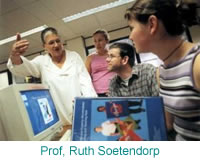
Bournemouth University, Wednesday, 29th October 2003 at 2pm in Room DG68, Talbot Campus
PROGRAMME:
1.45 for 2.00, TEA and WELCOME
(Martin Kretschmer & Ruth Soetendorp, Joint Directors CIPPM)
2.15 – KEYNOTE ADDRESS
Chris Kendall (Director, Asia Pacific Intellectual Property Law Institute; Murdoch University, Perth): “P2Pirates: Copyright and the Digital Dilemma”
3.15 – COFFEE
3.30 – INTERACTIVE SESSION
Intellectual Property: Challenges & Puzzles
Introductions
- Martin Kretschmer:
Geographical Indications - Edgar Forbes
- Friedemann Kawohl:
Maps & Art© - Edgar Forbes
- Phil Claire
Group work and Plenary
5.00 – 5.15, INTRODUCING THE IPKAT
Jeremy Phillips and Ilanah Simon about their blog at www.ipkat.com
5.15 – SANDWICH BUFFET
6.30 – INAUGURAL LECTURE (Allsebrook Lecture Theatre)
Prof. Ruth Soetendorp: “Food for Engineers”
CIPPM’s first graduate conference celebrates Ruth’s inaugural with a get-together of CIPPM students, graduates, members and fellows. The Interactive Session of the day relies on guests introducing a topical (possibly entertaining) prop, illustrating a current intellectual property policy challenge or a conceptual puzzle. After the group stage, a ‘solution’ is presented and argued back to the plenary.
The lecture commences at 6.30pm in the Allsebrook Lecture Theatre on the Talbot Campus of Bournemouth University (Talbot Village, Poole).
Abstract:
Following an introduction to intellectual property rights, a group of Japanese undergraduate engineers reported back to their professor ‘IPR should be like food for engineers to take every day.’
Individual innovators, inventors and creators want to understand how best to protect and exploit the fruit of their endeavours. Strategic management of IPR is central to the modern company’s economic success or failure. Policy makers, ethicists and philosophers are engaged in debates concerning the role and control of IP rights in activities as diverse as multimedia, telecommunications, and genetic modifications to human beings, animals and agricultural crops. Governments, industry, commerce and professional bodies identify a growing need for non-lawyers to understand IPR. EU Research Commissioner Philippe Busquin recently called for all students, especially in science, engineering and business schools, to graduate only after receiving training or awareness-raising in IPR and technology transfer.
This growth in interest challenges intellectual property academics. What exactly is ‘IPR for non-lawyers’? How should it be taught? Who is best to teach it? Researching these questions at Bournemouth has resulted in practical, transdisciplinary approaches to IPR education which recognise the importance of creating positive IPR encounters, on which students can build a lifelong interest in the subject.





